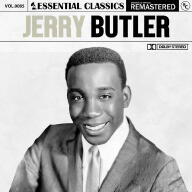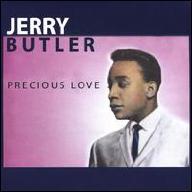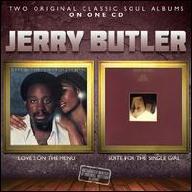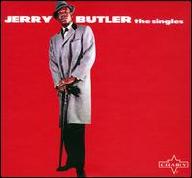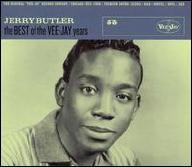Butler moved from Sunflower, Mississippi, to Chicago, Illinois at the age of three and grew up in the Cabrini-Green Housing Projects. He had initial music lessons as a young boy while a member of the church choir in Chicago. Curtis Mayfield, who was three years younger, was a member of the same choir. The two befriended each other and began a collaboration that would have an everlasting impact on music. The duo joined brothers Arthur and Richard Brooks and Sam Gooden to form the R&B group the Roosters. In fact, the Brooks brothers, Gooden, and a female singer they knew had migrated to Chicago from Tennessee and were called the Roosters a Chick. But when Butler and Mayfield joined them, the group became simply the Roosters. In 1957, the quintet's name was changed to Jerry Butler the Impressions. Butler scored his first hit with the Impressions in 1958 with the timeless ballad "For Your Precious Love." (He'd written the lyrics to the song when he was 16.)
That same year, Butler and the Impressions cordially split, and Butler began his solo career. He released his first single, "Lost," on the Abner label. It peaked at number 17 on the Billboard R&B charts. Jumping over to Vee-Jay in late 1960, where his career blossomed, Butler had his first hit as a solo artist with "He Will Break Your Heart." The single went to number one and stayed there for seven consecutive weeks. In 1961, Butler bounced back with two Top Ten singles: "Find Another Girl" and "I'm a Telling You." In 1967, he signed with Mercury and teamed up with the production duo of Kenny Gamble and Leon Huff. His work with these two master producers and songwriters resulted in some classic recordings, including the outstanding album The Ice Man Cometh. The album featured two number one singles ("Hey, Western Union Man" and "Only the Strong Survive") and two Top Ten singles ("Never Give You Up" and "Are You Happy"). Always known for being a crooner, "Hey, Western Union Man" revealed that Butler was more than capable of singing uptempo songs.
In 1971, Gamble and Huff formed their own label. Subsequently, Butler formed a creative workshop to help provide material for his forthcoming albums. He marketed dongs that he didn't use on his own albums to other artists. In the spring of 1971, Butler hit the Top Ten with the number eight single "If It's Real What I Feel," which was written by Chuck Jackson (the younger brother of Rev. Jesse Jackson). Butler continued his hit-making tradition with "Ain't Understanding Mellow," a classic soul-ballad duet with Brenda Lee Eager that peaked at number three on the Billboard R&B charts. He scored a number six single with Eager with a remake of the Carpenters' "(They Long to Be) Close to You" and a solo hit with a remake of the O'Jays' "One Night Affair," which was also his last song to crack the Top Ten.
Never one to categorize singers because he believed that a singer is a singer -- not based on genre, but merely on a person's ability to sing -- Butler himself covered several styles of music during his lengthy music career. He had many highs, ranging from sharing the spotlight with such greats as Aretha Franklin to being the chairman of the board for the non-profit Rhythm and Blues Foundation. Butler also became a force in another field: politics. In the mid-'80s, he was a significant campaign supporter of Chicago's first Black mayor Harold Washington. A short time later, he himself became the Cook County (Illinois) Commissioner, and by the late '90s, he was a Chicago City Alderman. In the meantime, he was inducted into the Rock & Roll Hall of Fame as a member of the Impressions in 1991. When the great Jerry Butler was not lobbying for his constituents -- he held public office until 2018 -- he could be found on-stage impressing with his Ice Man-cool delivery. ~ Craig Lytle, Rovi



